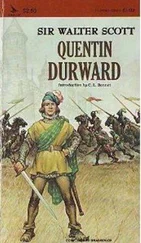Walter Scott - Letters on Demonology and Witchcraft
Здесь есть возможность читать онлайн «Walter Scott - Letters on Demonology and Witchcraft» весь текст электронной книги совершенно бесплатно (целиком полную версию без сокращений). В некоторых случаях можно слушать аудио, скачать через торрент в формате fb2 и присутствует краткое содержание. Жанр: История, на английском языке. Описание произведения, (предисловие) а так же отзывы посетителей доступны на портале библиотеки ЛибКат.
- Название:Letters on Demonology and Witchcraft
- Автор:
- Жанр:
- Год:неизвестен
- ISBN:нет данных
- Рейтинг книги:4 / 5. Голосов: 1
-
Избранное:Добавить в избранное
- Отзывы:
-
Ваша оценка:
- 80
- 1
- 2
- 3
- 4
- 5
Letters on Demonology and Witchcraft: краткое содержание, описание и аннотация
Предлагаем к чтению аннотацию, описание, краткое содержание или предисловие (зависит от того, что написал сам автор книги «Letters on Demonology and Witchcraft»). Если вы не нашли необходимую информацию о книге — напишите в комментариях, мы постараемся отыскать её.
Letters on Demonology and Witchcraft — читать онлайн бесплатно полную книгу (весь текст) целиком
Ниже представлен текст книги, разбитый по страницам. Система сохранения места последней прочитанной страницы, позволяет с удобством читать онлайн бесплатно книгу «Letters on Demonology and Witchcraft», без необходимости каждый раз заново искать на чём Вы остановились. Поставьте закладку, и сможете в любой момент перейти на страницу, на которой закончили чтение.
Интервал:
Закладка:
"The hanging of a great number of witches in 1645 and 1646 is famously known. Mr. Calamy went along with the judges on the circuit to hear their confessions, and see there was no fraud or wrong done them. I spoke with many understanding, pious, learned, and credible persons that lived in the counties, and some that went to them in the prisons, and heard their sad confessions. Among the rest an old reading parson , named Lowis, not far from Framlingham, was one that was hanged, who confessed that he had two imps, and that one of them was always putting him upon doing mischief; and he, being near the sea, as he saw a ship under sail, it moved him to send it to sink the ship; and he consented, and saw the ship sink before them." Mr. Baxter passes on to another story of a mother who gave her child an imp like a mole, and told her to keep it in a can near the fire, and she would never want; and more such stuff as nursery-maids tell froward children to keep them quiet.
It is remarkable that in this passage Baxter names the Witchfinder General rather slightly as "one Hopkins," and without doing him the justice due to one who had discovered more than one hundred witches, and brought them to confessions, which that good man received as indubitable. Perhaps the learned divine was one of those who believed that the Witchfinder General had cheated the devil out of a certain memorandum-book, in which Satan, for the benefit of his memory certainly, had entered all the witches' names in England, and that Hopkins availed himself of this record. [57] [57] This reproach is noticed in a very rare tract, which was bought at Mr. Lort's sale, by the celebrated collector Mr. Bindley, and is now in the author's possession. Its full title is, "The Discovery of Witches, in Answer to several Queries lately delivered to the Judge of Assize for the County of Norfolk; and now published by Matthew Hopkins, Witchfinder, for the Benefit of the whole Kingdom. Printed for R. Royston, at the Angel, in Inn Lane. 1647."
It may be noticed that times of misrule and violence seem to create individuals fitted to take advantage from them, and having a character suited to the seasons which raise them into notice and action; just as a blight on any tree or vegetable calls to life a peculiar insect to feed upon and enjoy the decay which it has produced. A monster like Hopkins could only have existed during the confusion of civil dissension. He was perhaps a native of Manningtree, in Essex; at any rate, he resided there in the year 1644, when an epidemic outcry of witchcraft arose in that town. Upon this occasion he had made himself busy, and, affecting more zeal and knowledge than other men, learned his trade of a witchfinder, as he pretends, from experiment. He was afterwards permitted to perform it as a legal profession, and moved from one place to another, with an assistant named Sterne, and a female. In his defence against an accusation of fleecing the country, he declares his regular charge was twenty shillings a town, including charges of living and journeying thither and back again with his assistants. He also affirms that he went nowhere unless called and invited. His principal mode of discovery was to strip the accused persons naked, and thrust pins into various parts of their body, to discover the witch's mark, which was supposed to be inflicted by the devil as a sign of his sovereignty, and at which she was also said to suckle her imps. He also practised and stoutly defended the trial by swimming, when the suspected person was wrapped in a sheet, having the great toes and thumbs tied together, and so dragged through a pond or river. If she sank, it was received in favour of the accused; but if the body floated (which must have occurred ten times for once, if it was placed with care on the surface of the water), the accused was condemned, on the principle of King James, who, in treating of this mode of trial, lays down that, as witches have renounced their baptism, so it is just that the element through which the holy rite is enforced should reject them, which is a figure of speech, and no argument. It was Hopkins's custom to keep the poor wretches waking, in order to prevent them from having encouragement from the devil, and, doubiless, to put infirm, terrified, overwatched persons in the next state to absolute madness; and for the same purpose they were dragged about by their keepers till extreme weariness and the pain of blistered feet might form additional inducements to confession. Hopkins confesses these last practices of keeping the accused persons waking, and forcing them to walk for the same purpose, had been originally used by him. But as his tract is a professed answer to charges of cruelty and oppression, he affirms that both practices were then disused, and that they had not of late been resorted to.
The boast of the English nation is a manly independence and common-sense, which will not long permit the license of tyranny or oppression on the meanest and most obscure sufferers. Many clergymen and gentlemen made head against the practices of this cruel oppressor of the defenceless, and it required courage to do so when such an unscrupulous villain had so much interest.
Mr. Gaul, a clergyman, of Houghton, in Huntingdonshire, had the courage to appear in print on the weaker side; and Hopkins, in consequence, assumed the assurance to write to some functionaries of the place the following letter, which is an admirable medley of impudence, bullying, and cowardice:—
"My service to your worship presented.—I have this day received a letter to come to a town called Great Houghton to search for evil-disposed persons called witches (though I hear your minister is far against us, through ignorance). I intend to come, God willing, the sooner to hear his singular judgment in the behalf of such parties. I have known a minister in Suffolk as much against this discovery in a pulpit, and forced to recant it by the Committee [58] [58] Of Parliament.
in the same place. I much marvel such evil men should have any (much more any of the clergy, who should daily speak terror to convince such offenders) stand up to take their parts against such as are complainants for the king, and sufferers themselves, with their families and estates. I intend to give your town a visit suddenly. I will come to Kimbolton this week, and it will be ten to one but I will come to your town first; but I would certainly know before whether your town affords many sticklers for such cattle, or is willing to give and allow us good welcome and entertainment, as others where I have been, else I shall waive your shire (not as yet beginning in any part of it myself), and betake me to such places where I do and may punish (not only) without control, but with thanks and recompense. So I humbly take my leave, and rest your servant to be commanded,
"MATTHEW HOPKINS."
The sensible and courageous Mr. Gaul describes the tortures employed by this fellow as equal to any practised in the Inquisition. "Having taken the suspected witch, she is placed in the middle of a room, upon a stool or table, cross-legged, or in some other uneasy posture, to which, if she submits not, she is then bound with cords; there she is watched and kept without meat or sleep for four-and-twenty hours, for, they say, they shall within that time see her imp come and suck. A little hole is likewise made in the door for the imps to come in at; and lest they should come in some less discernible shape, they that watch are taught to be ever and anon sweeping the room, and if they see any spiders or flies, to kill them; and if they cannot kill them, they may be sure they are their imps."
If torture of this kind was applied to the Reverend Mr. Lewis, whose death is too slightly announced by Mr. Baxter, we can conceive him, or any man, to have indeed become so weary of his life as to acknowledge that, by means of his imps, he sunk a vessel, without any purpose of gratification to be procured to himself by such iniquity. But in another cause a judge would have demanded some proof of the corpus delecti , some evidence of a vessel being lost at the period, whence coming and whither bound; in short, something to establish that the whole story was not the idle imagination of a man who might have been entirely deranged, and certainly was so at the time he made the admission. John Lewis was presented to the vicarage of Brandiston, near Framlington, in Suffolk, 6th May, 1596, where he lived about fifty years, till executed as a wizard on such evidence as we have seen. Notwithstanding the story of his alleged confession, he defended himself courageously at his trial, and was probably condemned rather as a royalist and malignant than for any other cause. He showed at the execution considerable energy, and to secure that the funeral service of the church should be said over his body, he read it aloud for himself while on the road to the gibbet.
Читать дальшеИнтервал:
Закладка:
Похожие книги на «Letters on Demonology and Witchcraft»
Представляем Вашему вниманию похожие книги на «Letters on Demonology and Witchcraft» списком для выбора. Мы отобрали схожую по названию и смыслу литературу в надежде предоставить читателям больше вариантов отыскать новые, интересные, ещё непрочитанные произведения.
Обсуждение, отзывы о книге «Letters on Demonology and Witchcraft» и просто собственные мнения читателей. Оставьте ваши комментарии, напишите, что Вы думаете о произведении, его смысле или главных героях. Укажите что конкретно понравилось, а что нет, и почему Вы так считаете.









